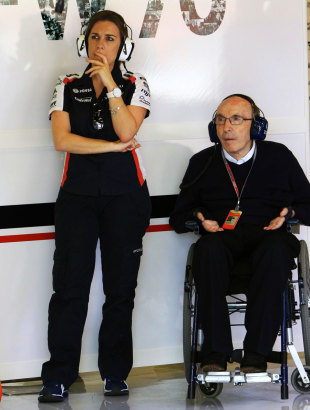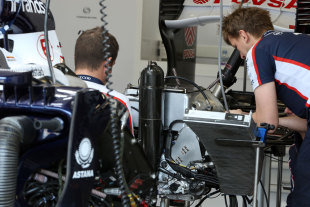- GP Week
'The pressure's always on'
Six months after her promotion to deputy team principal at Williams, GPWeek's Trent Price caught up with Claire Williams to discuss Williams' fortunes and the current state of Formula One

While it must be frustrating to be a few tenths down on the opposition, Williams have in actual fact dramatically closed the gap on the leaders since Melbourne, even if it isn't reflected on the grid. What's been the main contributing factor for the turn-around?
I think you can look at each race and look at margins between us and the frontrunners, but overall we're definitely not where we want to be. You can say in some races we're a second behind and in others we're half a second. But it's your position on the grid that matters and at the moment we're P17 and P18 in practice and that is not where we want to be.
Where do you think the fluctuation is? Is it a baseline issue or the tightness of the midfield pack at the moment?
I think it's the baseline of the car really. Different cars can behave differently on different circuits, so sometimes we'll be with the Saubers and sometimes we'll be further away from them, or whoever it may be.
Pat Symonds has always been good at delivering a car with a strong baseline and made up a Cosworth engine deficit of around a second to Caterham Renault just through handling. With Pat coming on board, do you think that provides a good platform at Williams, all things considered?
It is. We were very lucky that Pat was available as quickly as he was. We wanted to make changes sooner rather than later. You know what it's like in this sport where people are on very long 'gardening leave' during contracted times, but Pat was able to join us on a consultancy basis very quickly. He's taken a long hard look at our processes, our structures and procedures and the resources that we have and make sure everything's operating efficiently. He joined us just before Spa and he's already having a significant impact on the business.
The mid-pack battle has been tighter than ever this year. Do you think there's more pressure in the midfield this year than there is at the front of the grid?
When we go into a race we have a plan to have as clean a race as possible, but the pressure's always on. Can you imagine being one of the guys on a pit stop? Monza was fine because they only had to do two stops, but in some races they're doing as much as eight stops. The pressure on those guys to do a stop in sub-three seconds in order for it to be classed as 'competitive' is just extraordinary. Even for the engineers on the pit wall, trying to extract performance out of the car that isn't there comes with significant pressure.
Has your partnership with Michael Johnson Performance helped in that respect?
Yes, at the start and end of every year we do a performance enhancement program with them and during the course of the year the guys have an intensive training schedule. We have a personal trainer not only at the racetrack, but on Saturday at the end of the day's work the guys have an hour-and-a-half training session to make sure they're as fit as they can be. In addition we have a dedicated rig each crew member can practice changing tyres on individually.

With an engine deal done you must be confident that Mercedes will be one of the top powerplants next year?
It's so difficult to tell. It's like whenever we head to Australia you always wonder where you are. You do the maths and you believe you've got 'X' number of performance but you never know what everyone else has done. But we have a huge amount of confidence in Mercedes. They're a great brand, a great engineering company and our technical team are working closely with there's to make sure that we give them and they give us everything we need in preparation for next year.
I was lucky enough to catch you in China for your first principal/deputy team principals' press conference. Has the media side become easier and are you enjoying it more?
I am. Whether I'm deputy team principal or press officer it's an honour to be able to do these amazing jobs for the team. It does get a bit easier but it's still quite daunting on a press conference stage surrounded by the likes of Eric Boullier. But one of the great things about life is that you get to stretch yourself, and it's great being given the opportunity to do that.
As a student of politics is there anything that surprised you when you began working in the F1 paddock?
I was thinking about this the other day. When you study politics you study 'first past the post' systems and proportional representation. It's not necessarily the same is it? [laughs] Maybe subconsciously it's helped, but I've been lucky enough to grow up in this sport so rather than be surprised, I'm used to how it operates.
With cost cuts and dealing with FOTA are there situations where you think to yourself, 'things would be a whole lot easier if we just did this'?
Of course you'd love to be in a utopian society, and in an ideal world everyone would want to sit round the table and do things fairly and see what pours out of that. But this is such a competitive environment that that would go against their natural instincts. Your natural instinct is to fight for your team, especially as an independent team.
Do you think [Force India Deputy Team Principal] Bob Fernley had a point when he suggested the teams should relinquish power to someone else to save all the arguments?
I think Bob had a legitimate point and I'd like to see if that would work, but could that then bring its own set of problems? Could people then go and lobby that person to get their way? There's always a way around things. This is how our sport's always been and this is how it is for the time being.

